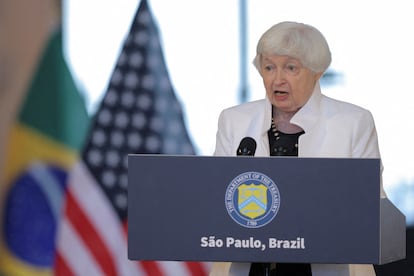Yellen urges world leaders to ‘unlock’ frozen Russian Central Bank assets and send them to Ukraine
The United States and its allies froze hundreds of billions of dollars in Russian foreign holdings in retaliation for Moscow’s invasion of Ukraine. More than two-thirds of the funds are located in the EU

Treasury Secretary Janet Yellen on Tuesday offered her strongest public support yet for the idea of liquidating roughly $300 billion in frozen Russian Central Bank assets and using them for Ukraine’s long-term reconstruction.
“It is necessary and urgent for our coalition to find a way to unlock the value of these immobilized assets to support Ukraine’s continued resistance and long-term reconstruction,” Yellen said in remarks in Sao Paulo, Brazil, where Group of 20 finance ministers and central bank governors are meeting this week.
“I believe there is a strong international law, economic, and moral case for moving forward. This would be a decisive response to Russia’s unprecedented threat to global stability,” she said.
The United States and its allies froze hundreds of billions of dollars in Russian foreign holdings in retaliation for Moscow’s invasion of Ukraine. Those billions have been sitting untapped as the war grinds on, now in its third year, while officials from multiple countries have debated the legality of sending the money to Ukraine. More than two-thirds of Russia’s immobilized central bank funds are located in the EU.
Using the assets to help Ukraine “would make clear that Russia cannot win by prolonging the war and would incentivize it to come to the table to negotiate a just peace with Ukraine,” Yellen said.
The idea of using Russia’s frozen assets has gained traction lately as continued allied funding for Ukraine becomes more uncertain and the U.S. Congress is in a stalemate over providing more support. But there are tradeoffs since the weaponization of global finance could harm the U.S. dollar’s standing as the world’s dominant currency.
Yellen said Tuesday that it is “extremely unlikely” that tapping the frozen funds would harm the dollar’s standing in the global economy “especially given the uniqueness of the situation where Russia is brazenly violating international norms. Realistically there are not alternatives to the dollar, euro and yen,” Yellen said.
Earlier this month, the European Union passed a law to set aside windfall profits generated from frozen Russian central bank assets. Yellen calls that “an action I fully endorse.”
Brazil kicked off its presidency of the Group of 20 nations this month, with finance ministers meeting this week. Topics for discussion include poverty alleviation, climate change and the wars in the Gaza Strip and in Ukraine. G20 leaders are slated to gather at a Nov. 18-19 summit in Rio.
Sign up for our weekly newsletter to get more English-language news coverage from EL PAÍS USA Edition
Tu suscripción se está usando en otro dispositivo
¿Quieres añadir otro usuario a tu suscripción?
Si continúas leyendo en este dispositivo, no se podrá leer en el otro.
FlechaTu suscripción se está usando en otro dispositivo y solo puedes acceder a EL PAÍS desde un dispositivo a la vez.
Si quieres compartir tu cuenta, cambia tu suscripción a la modalidad Premium, así podrás añadir otro usuario. Cada uno accederá con su propia cuenta de email, lo que os permitirá personalizar vuestra experiencia en EL PAÍS.
¿Tienes una suscripción de empresa? Accede aquí para contratar más cuentas.
En el caso de no saber quién está usando tu cuenta, te recomendamos cambiar tu contraseña aquí.
Si decides continuar compartiendo tu cuenta, este mensaje se mostrará en tu dispositivo y en el de la otra persona que está usando tu cuenta de forma indefinida, afectando a tu experiencia de lectura. Puedes consultar aquí los términos y condiciones de la suscripción digital.








































